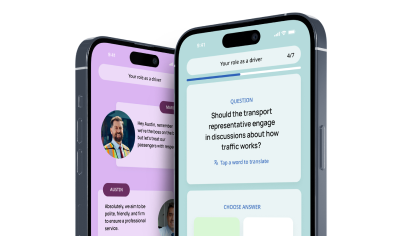In the hospitality industry, customer service is paramount. It can make or break a guest's experience and ultimately impact your business's success. That's why investing in customer service skills training for your team is crucial. In this quick guide, we will explore the importance of customer service in hospitality and discuss the core and creative customer service skills that can genuinely make a difference in service.
Understanding the importance of customer service training in hospitality
Customer service goes beyond simply meeting the needs of guests. It involves creating memorable experiences that leave a lasting impression. In the competitive hospitality industry, excellent customer service sets you apart and builds customer loyalty.
When guests feel valued and appreciated, they are more likely to return and recommend your establishment to others. It's not just about providing a comfortable bed or delicious food; it's about exceeding customer expectations and making guests feel special.
Personalisation is crucial to delivering outstanding customer service in the hospitality sector. By understanding guests' individual preferences and needs, you can tailor their experience to make it truly unique. This could involve remembering their favourite drink, anticipating their requirements before they even ask, or engaging in friendly conversation to make them feel at home.
Moreover, excellent customer service in hospitality extends beyond the physical premises of the establishment. In today's digital age, online reviews and social media play a significant role in shaping a hotel or restaurant's reputation. By providing top-notch service and ensuring guest satisfaction, you create positive word-of-mouth marketing and enhance your online presence, attracting more potential customers.
Core skills to practice in the customer service training program
While technical skills are essential in the hospitality industry, interpersonal skills make a difference in great customer service. Here are some core customer service skills that your team should possess:
In addition to these essential skills, there are a few more key attributes that can elevate your team's customer service to the next level:
- Active listening: Listening attentively to guests' needs and concerns is essential for personalised service.
- Empathy: Understanding and relating to guests' emotions allows your team to provide genuine and supportive customer care.
- Clear communication: Articulating information clearly and professionally ensures smooth interactions with guests.
- Problem-solving: Quick thinking and resourcefulness are crucial in handling guest issues and finding satisfactory solutions.
- Adaptability: Being flexible and adaptable to different guest preferences and situations is critical to delivering exceptional service.
Another vital skill for your team is patience. Dealing with a diverse range of guests means that situations can vary greatly, and having the patience to handle each one with care and attention is paramount.
Skills that make a difference in your customer service training courses
While core customer service skills are essential, adding a touch of creativity can elevate the level of service provided. Here are some creative customer service skills that can make a difference:
- Master storytelling Storytelling has the power to engage and captivate guests. By sharing interesting anecdotes about your establishment or the local culture, you create memorable experiences. This not only entertains guests but also gives them a deeper connection to the place they're visiting. Consider training staff to weave in stories about the history of your establishment or the local area, making the experience richer and more engaging.
- Use humour A well-timed joke or a light-hearted comment can create a friendly atmosphere and put guests at ease. However, it's essential to gauge the appropriateness of humour based on each guest's personality and cultural background. Humour can break the ice and make interactions more enjoyable, but it must be used carefully to ensure it is well-received and doesn't offend.
- Enhance culinary knowledge Providing insights into the ingredients, cooking techniques, and origin of dishes can enhance the dining experience and make guests appreciate the food even more. Encouraging staff to know and share details about menu items can transform a meal into a learning experience, adding value and depth to what might otherwise be a simple dining occasion.
- Stay mindful during interactions Mindfulness involves being fully present and attentive during guest interactions. This helps to establish a genuine connection and deliver personalised service tailored to each guest's needs. Training staff in mindfulness techniques can improve their ability to focus on guests, listen actively, and respond thoughtfully, enhancing overall guest satisfaction.
- Personalise experiences Remembering guest preferences, such as their favourite drink or room location, and incorporating these personal touches into their experience can make them feel valued and appreciated. Personalisation shows attention to detail and care, fostering loyalty and repeat visits as guests feel uniquely catered to.
- Develop cultural intelligence In today's multicultural world, understanding and respecting different cultures is essential. Cultural intelligence allows your team to adapt their approach and provide culturally sensitive service. This skill helps avoid misunderstandings and ensures all guests feel respected and comfortable, regardless of their cultural background.
- Master digital tools and platforms With the increasing use of technology in the hospitality industry, proficiency in digital tools and platforms can help streamline operations and provide a seamless guest experience. Training staff to use booking systems, customer management software, and other digital tools ensures efficiency and enhances the guest experience.
- Encourage your staff to take initiative Empowering your team to take initiative and make quick decisions when necessary show guests that you trust their judgment and are committed to providing exceptional service. This autonomy can lead to quicker problem resolution and a more dynamic, responsive service environment.
- Promote sustainability knowledge Knowledge of sustainable practices in the hospitality industry, such as reducing waste and energy consumption, can resonate with environmentally conscious guests and enhance their experience. Staff trained in sustainability can also educate guests on how they can contribute to eco-friendly practices during their stay.
- Learn multi-language skills Communicating in different languages can break down barriers and create a more inclusive and welcoming environment for international guests. Encouraging staff to learn and use basic phrases in multiple languages can make a significant difference in how comfortable and welcomed guests feel.
- Read and respond to guests' emotions Emotional intelligence plays a vital role for the customer service team. Understanding guests' emotions and responding appropriately can turn a potentially harmful experience into a positive one. Training staff to pick up on emotional cues and respond empathetically can significantly enhance customer satisfaction.
- Share your knowledge about local art and artists Information about local art and artists can enhance guests' cultural experience and create exciting conversations. This can make the visit more enriching and memorable, as guests appreciate learning about the local culture and supporting local artists.
- Use positive body language to build rapport. Nonverbal cues, such as a warm smile or attentive posture, can convey friendliness and approachability. This helps establish a positive rapport with guests, making them feel more at ease and valued during their stay.
- Stay ahead by anticipating potential conflicts Proactively identifying potential conflicts and addressing them before they escalate shows guests that you genuinely care about their experience and ensures a smooth and enjoyable stay. This foresight can prevent negative experiences and demonstrates a high level of professionalism and care.
- Always go the extra mile to amaze clients Exceeding customer expectations by delivering surprises or personalised gestures creates memorable experiences that guests will cherish and share with others. This can include complimentary upgrades, special treats, or handwritten notes, all of which can leave a lasting positive impression.
How to prepare training for customer service skills practice
Now that you know the essential customer service communication skills, it's time to prepare training for your team to practice and develop them. Here are some steps to consider:
- Identify specific areas for improvement based on individual and team assessments.
- Design interactive training sessions that incorporate role-playing and real-life scenarios.
- Provide ongoing feedback and coaching to help your team refine their customer service talents.
- Encourage collaboration and peer learning to foster a supportive and learning-oriented environment.
- Utilise technology tools and platforms to enhance training effectiveness and efficiency.
- Monitor progress and measure the impact of the training through guest feedback and performance evaluations.
When identifying specific areas for improvement, involving your team members in the process is crucial. Conducting one-on-one meetings or group discussions can provide valuable insights into individual strengths and weaknesses. By understanding each team member's unique skill set, you can effectively tailor the training programme to address their specific needs.
Furthermore, designing interactive training sessions should focus on theoretical knowledge and practical application. Incorporating case studies and simulations can immerse your team in real-life scenarios, allowing them to develop communication skills and emotional intelligence. Role-playing exercises, where team members take on different customer personas, can help them empathise with various customer situations and respond appropriately.
Transform your team with Lingio's innovative training solutions
Ready to take your hospitality team's talents to the next level? Discover the power of fun, engaging, and practical training with Lingio. Our AI-driven customer service courses, combined with gamification, are designed to accelerate learning and enhance your team's performance. Take advantage of the opportunity to see our innovative approach in action. Book a demo today and witness firsthand how Lingio can revolutionise training and development for your staff.
FAQs
1. How long should customer service training last?
The duration of customer service training can vary depending on your team's specific needs. However, it's recommended that regular training sessions be held to reinforce and develop these skills continuously.
When considering the length of customer service training, it's essential to consider the complexity of the skills being taught and the level of experience of your team members. A more extensive training programme may be necessary for new employees to ensure they grasp the fundamentals. At the same time, seasoned staff may benefit from shorter, more focused sessions to refine their existing skills.
2. Can customer service agents learn the needed skills in a few weeks?
While some individuals may naturally be inclined towards customer service, these skills can be learned and developed through training, practice, and experience. It is usually not a matter of weeks but rather months of practice and regular visits to customer service training programs.
It's essential to recognise that customer service communication skills encompass many abilities, including empathy, communication, problem-solving, and conflict resolution. These skills can be honed through targeted training initiatives focusing on real-life scenarios and practical exercises. By providing ongoing support and guidance, even employees struggling with customer service can improve and excel in this crucial aspect of their role.
3. What are the benefits of investing in customer service training?
Investing in customer service training leads to improved customer satisfaction, increased customer loyalty, positive word-of-mouth recommendations, and business growth and success.
Enhancing customer service skills within your team benefits the individuals involved and has a direct impact on your business's reputation and bottom line. Satisfied customers are more likely to return, recommend your services to others, and contribute to a positive brand image. By prioritising ongoing training and development in this area, you are investing in your organisation's long-term success and sustainability.

Table of contents
Intro
Understanding the importance of customer service training in hospitality
Core skills to practice in the customer service training program
Skills that make a difference in your customer service training courses
How to prepare training for customer service skills practice
Transform your team with Lingio's innovative training solutions
FAQs

